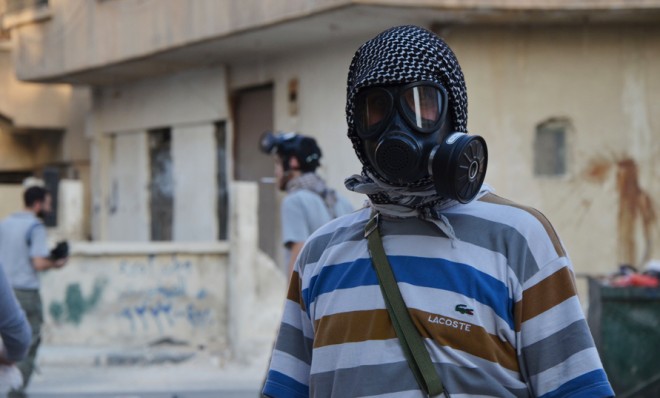Are Syria's cluster bombs and bioweapons worse than its chemical weapons?
The alleged sarin gas attack was horrible. Releasing biological weapons could be much worse.

A free daily email with the biggest news stories of the day – and the best features from TheWeek.com
You are now subscribed
Your newsletter sign-up was successful
Secretary of State John Kerry swears that U.S. intelligence is confident that the Syrian government used sarin gas to kill 1,429 people in the Damascus suburb of Ghouta. And Syrian President Bashar al-Assad has plenty more where that came from.
The Syrian government runs the most advanced chemical weapons program in the developing world, according to NBC News, with an arsenal of sarin, mustard gas, and other chemicals that is estimated at 1,000 tons strong.
Video and photographic evidence reportedly from the scene of the sarin attack is disturbing. While there is debate whether death by sarin gas is worse than death by conventional weapons, most of the world has agreed to ban the use of chemical weapons during warfare.
The Week
Escape your echo chamber. Get the facts behind the news, plus analysis from multiple perspectives.

Sign up for The Week's Free Newsletters
From our morning news briefing to a weekly Good News Newsletter, get the best of The Week delivered directly to your inbox.
From our morning news briefing to a weekly Good News Newsletter, get the best of The Week delivered directly to your inbox.
Now several reports suggest that Assad has two more dangerous weapons at his disposal: Cluster bombs and biological weapons.
Syria has already used cluster bombs more than a dozen times, according to a new report by Human Rights Watch. Cluster bombs explode in the air, releasing dozens or even hundreds of tiny bomblets across an area as big as a football field, which explode on impact and send shrapnel in all directions.
The bomblets that fail to explode can act like land mines — meaning they can pose a longer-lasting threat than sarin gas, which can linger in the air for up to six hours.
In December 2012, The New York Times reported from the scene of a cluster bomb attack in the small Syrian town of Marea:
A free daily email with the biggest news stories of the day – and the best features from TheWeek.com
Two journalists from The New York Times were traveling toward Marea as the attack occurred and arrived not long after the exploding bomblets had rippled across its neighborhoods.
Blood pooled on the street, including beside a water-collection point at an intersection where Nabhan al-Haji, 18, was killed.
Another victim, Ahmad Najjar Asmail, had been riding a motorcycle when a submunition landed beside him. He was decapitated. [New York Times]
Cluster bombs have been banned by many countries because, in the words of the report, of their "widespread indiscriminate effect at the time of use, and the long-lasting danger they pose to civilians."
Syria — like the United States, China, and Russia — is not one of the 112 countries that have signed the Convention on Cluster Munitions, "which prohibits the use, production, transfer and stockpiling of cluster munitions."
The United States, however, is one of the countries that has banned biological weapons — of which Syria has plenty.
While there is no sign that the Assad regime has used them yet, a congressional report released earlier this year stated that Syria has a "longstanding biological weapons program … that may have advanced beyond the research and development stage, and may be capable of limited agent production," according to The Washington Post.
Experts don't agree on whether Syria is capable of weaponizing biological agents. If it is, a desperate Assad could create a much deadlier scene than the one at Ghouta.
"We are worried about sarin, but Syria also has biological weapons, and compared to those, sarin is nothing," a senior Middle Eastern official told The Washington Post. "We know it, and others in the region know it. The Americans certainly know it."
In 2012, Syrian Foreign Ministry spokesman Jihad Makdissi seemed to admit as much by claiming that Syria would never use "any chemical and biological weapons" and that its military was safeguarding "all stocks of these weapons." He later retracted his statement, denying that Syria had either.
Jill Bellamy van Aalst, a biodefense consultant to NATO and the European Union, told The Washington Post that Syria's biological weapons stockpile is real and, while possibly small, still dangerous. It probably includes botulinum, a neurotoxin, and camelpox and cowpox, viruses that are related to smallpox, she said.
The charge against chemical weapons and cluster bombs — that they kill indiscriminately — applies even more to biological weapons, which, thanks to the unpredictability of pathogens, could lead to widespread pandemics.
Keith Wagstaff is a staff writer at TheWeek.com covering politics and current events. He has previously written for such publications as TIME, Details, VICE, and the Village Voice.
-
 9 products to jazz up your letters and cards
9 products to jazz up your letters and cardsThe Week Recommends Get the write stuff
-
 AI surgical tools might be injuring patients
AI surgical tools might be injuring patientsUnder the Radar More than 1,300 AI-assisted medical devices have FDA approval
-
 ‘Zero trimester’ influencers believe a healthy pregnancy is a choice
‘Zero trimester’ influencers believe a healthy pregnancy is a choiceThe Explainer Is prepping during the preconception period the answer for hopeful couples?